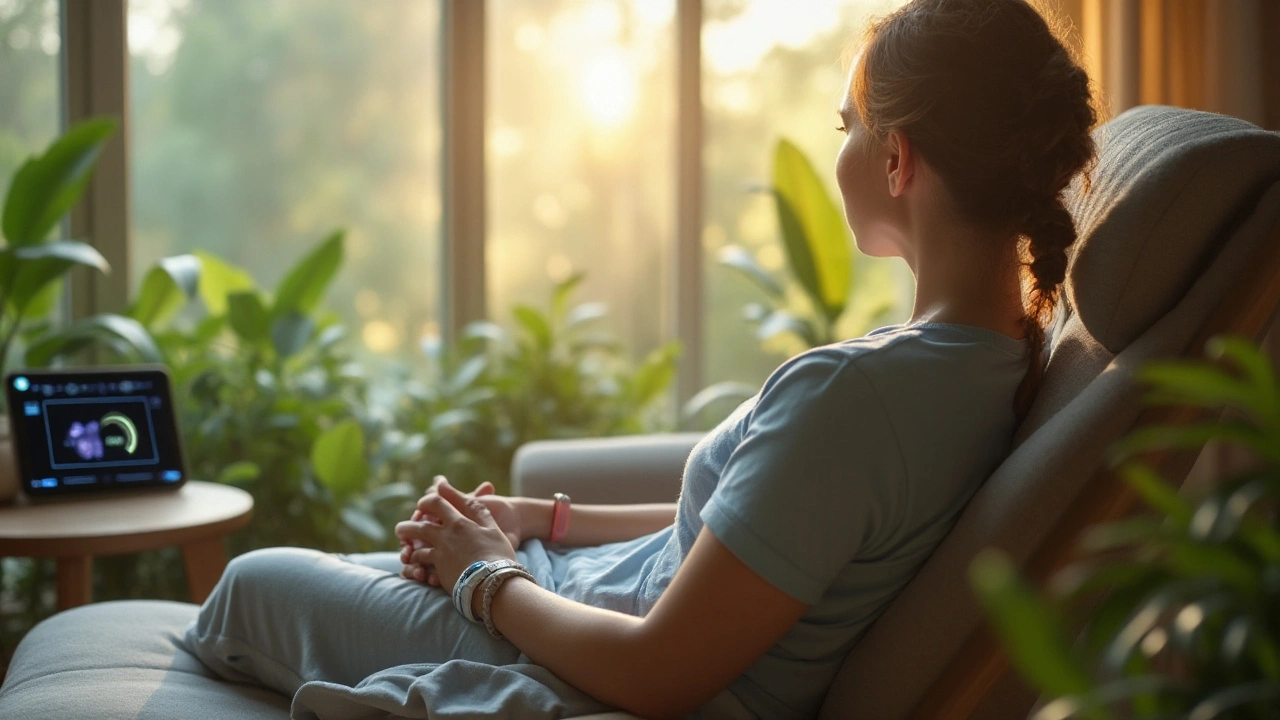Chronic stress can actually shrink the brain area that handles memory and focus. That sounds scary, but the good news is small changes reverse a lot of that damage. If stress is taking energy, sleep, or patience away from your life, try these clear, usable steps that fit into a busy day.
First, learn one breathing tool and use it whenever you feel tense. Box breathing works well: inhale for 4 seconds, hold for 4, exhale for 4, hold for 4. Do this 3–5 times and you’ll lower your heart rate and clear your mind. Want something even shorter? Try a 2-minute belly-breathing reset: slow breath in, slow breath out, count to four on both.
Micro-breaks beat long meltdowns. Every 60–90 minutes stand up, stretch, and walk for 5 minutes. Add a quick body scan: tense each muscle group for 3 seconds then release. That resets stress hormones and helps you think straight. If you work shifts or long hours, schedule two 10-minute resets—one mid-shift and one after work—to divide the day into manageable chunks.
Move your body in a way you enjoy. A brisk 10–20 minute walk clears stress chemicals and improves digestion. If you prefer strength training or yoga, prioritize consistency over intensity. Even 15 minutes of gentle movement daily lowers anxiety and improves sleep.
Mindfulness doesn’t require long meditation sessions. Try a single mindful meal a day: eat without screens, notice textures and flavors, chew slowly. That helps stress-related overeating and improves digestion. For sleep, pick a single wind-down ritual—no screens 30 minutes before bed, dim lights, and 10 minutes of journaling to offload worries.
Boundaries matter. Saying no protects your energy. Start small: decline one non-essential request each week. Use clear words: “I can’t this time, but I can help on X date” or offer a shorter option. You’ll find you keep more time for recovery and things that matter.
Try quick tech aids. Biofeedback apps and simple wearables show heart-rate trends and guide breathing in real time. Creative outlets—drawing, playing an instrument, or 10 minutes of free writing—often lower stress faster than scrolling social media. If your anxiety feels stuck, short-term therapy or a stress-management class can add tools you won’t learn on your own.
Finally, small nutrition and routine moves add up. Cut high-sugar drinks that spike stress, choose a protein-rich snack mid-afternoon, and drink green tea instead of multiple coffees. Keep water handy and aim for consistent sleep and light exposure in the morning to reset your circadian rhythm.
Pick two changes from this page and try them for two weeks. Track one simple result—better sleep, fewer flare-ups, or calmer reactions. Those small wins build quickly, and that’s how stress stops running your life.

Discover effective stress reduction strategies, backed by science and practical tips, to boost mental and physical health for a happier, healthier life.
Read More
Discover how mindfulness can help you lose weight by changing your eating habits, managing stress, and building a healthier relationship with food.
Read More
Ever wondered how to become truly aware of your body and calm your mind on command? This article walks you through how biofeedback works and why it’s such a game-changer for mindfulness. You’ll learn what happens inside your body when you’re stressed or relaxed, plus how to harness simple gadgets to tune into those signals. We’ll share practical ways to use biofeedback tools in everyday life, whether you want less anxiety, better focus, or simply a break from racing thoughts. There are real stories, clear tips, and zero fluff.
Read More
Staying calm isn’t just about feeling good—it’s actually a superpower when it comes to getting ahead. This article explores why calmness matters for reaching your goals, how it shapes your mindset, and what happens in your brain when you stay cool under pressure. You’ll find everyday examples that prove calm people often win in work and life, along with easy tips to boost your own calm factor. By the end, you just might see relaxation as your secret weapon, not a luxury. Get ready for practical advice you can use right away.
Read More
Calmness might seem like a luxury these days, but it’s actually a power tool for daily life. This article explores how maintaining calm can enhance relationships, boost productivity, and improve mental health. With practical tips on managing stress and fostering mindfulness, it turns calmness into a practical habit rather than an elusive state. Readers will discover relatable thoughts on incorporating tranquility into their routines, benefiting both personal and professional spheres.
Read More
Biofeedback is transforming healthcare by providing real-time insights into physiological functions. This article explores how biofeedback works, its applications in stress reduction, and its benefits for chronic condition management. It highlights practical tips for incorporating biofeedback into daily life and discusses the future potential in healthcare. Dive into how this innovative approach is changing the face of healthcare.
Read More
Reducing stress is essential for maintaining mental well-being and improving quality of life. Discover practical tips and strategies to manage stress effectively, from daily habits to mindful relaxation techniques. Learn about the impact of stress on the brain and body, and how to foster resilience in challenging times. Explore how simple changes can significantly enhance your mental health. By understanding and managing stress, you can lead a happier, more balanced life.
Read More
Finding calmness in today’s fast-paced world can be challenging, yet it's essential for overall well-being. This guide explores practical strategies to cultivate peace in daily life by delving into mindfulness practices, relaxation techniques, and lifestyle adjustments. It highlights how reconnecting with nature, embracing minimalism, and incorporating mindful habits can significantly impact your state of mind. With actionable tips and insights, this guide aims to help you master calmness and enhance your sense of tranquility.
Read More
Biofeedback represents a novel method for managing stress by teaching individuals to control physiological functions that typically occur involuntarily. By gaining insight into their body's responses, people can learn to reduce stress and improve mental health. This non-invasive technique leverages technology to measure heart rate, muscle tension, and more, providing real-time feedback. Biofeedback is especially beneficial for those seeking holistic and drug-free methods to enhance their well-being.
Read More
Biofeedback is a powerful tool in enhancing mental well-being by teaching individuals how to control bodily processes that are usually automatic, such as heart rate and muscle tension. By using sensors to monitor physiological functions, biofeedback provides real-time data that helps in self-regulation and stress management. This method can be particularly helpful for those battling anxiety, depression, or chronic pain by promoting a better mind-body connection. The growing interest in natural, non-invasive treatments has led to biofeedback being recognized as a supportive approach in improving mental health outcomes.
Read More